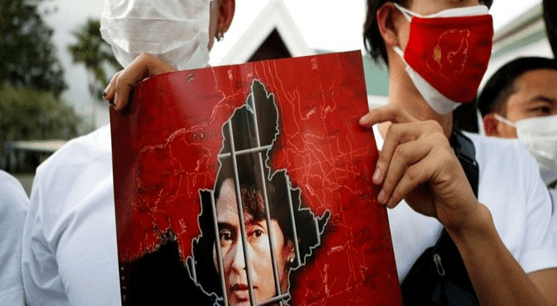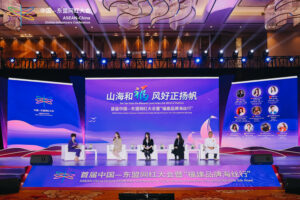
Myanmar, also known as “Burma” is perhaps the most controversial country in the ASEAN region nowadays. What happened last February 1, 2021, where the “Tatmadaw,” – Myanmar’s military, seized power in a coup against the elected government of the Nobel laureate Daw Aung San Suu Kyi.
Kyi ‘s detention alongside some senior leaders of her party, the National League for Democracy (NLD), including President U Win Myint, NLD’s chief ministers and ministers in the states and regions, NLD lawmakers, and some critics of the military, is like history repeating itself.
The world once again is getting a glimpse and a picture of the same mishap that had transpired during the May 1990 elections in Myanmar when the Burmese voted for democracy and their freedom from the clutches and shackles of the military rule in the country but has been harshly suppressed by the “military junta” that is eager to preserve power and wealth at the expense of the peoples of Myanmar since its inception in 1988.
A Repeat of History
Elections thus far have been regularly held for most of Myanmar’s independent history. The last two meaningful elections were the May 1990 and November 2020 national elections where NLD won the most seats in parliament and claimed victory. Nevertheless, these significant political events of Myanmar had similarly suffered the same bleak and despairing fate.
Like a “déjà vu,” the political turmoil in Myanmar these days is like a recap, a repeat, and rerun of history. It was not the first attempt to instill democratic change in the country, but similar to the November 2020 elections, was one of the most conscious efforts put forward to change the political landscape of the country by almost all political stakeholders, which include the democratic opposition groups led by the NLD with Suu Kyi at the helm together with the various ethnic nationalities of Myanmar.
Similarly, the military junta to transfer power, the Tatmadaw refused and cited alleged unsettled issues regarding the electoral irregularities and fraud, staged a coup, and instigated “crackdowns” by detaining senior leaders of NLD including Suu Kyi and leaders of various ethnic nationalities who were pro-democracy. That day is known in Myanmar as the “Black Friday.”
This is indeed a clear indication that the military junta has remained unyielding to transfer power to a civilian government and is adversely against the prospects of democracy flourishing in the country.
The people of Myanmar once again are in confrontation with the overpowering, obstinate, and brazen military junta as they stage series of “civil disobedience” campaign protests spreading across the country participated by women, men, the youth, students, workers and even by health professionals of various ethnic backgrounds.
Every night since the military “take-over”, “pans and pots clanking campaign” as a gesture of protest have been on-going across the country. These civil disobedience protest actions are but emblems and insignias of defiance to the military coup and are expressions of the loyalty of the peoples of Myanmar/Burma to the cause of democracy.
The peoples of Myanmar/Burma for several days now are also clamoring for the release of all detainees including their iconic democratic leader Daw Aung San Suu Kyi, and for the military to honor and respect the results of the 8 November 2020 elections of which the NLD had garnered 83 percent of the votes, which means that NLD candidates won 920 out of the 1,117 elected seats nationwide, and to allow the new Parliament to convene.
Nevertheless, same as before, such clamors landed on deaf ears as the Tatmadaw declared U Myint Swe, a former military general, as acting President while the country is under a nationwide state of emergency for one year under Article 417 of the country’s 2008 Constitution.
Whereas, the country’s legislative, administrative and judicial powers were transferred to the military’s commander-in-chief Min Aung Hlaing, a Burmese army general who is concurrently serving as Chairman of the State Administrative Council following Article 419 of the military-backed 2008 Constitution until the alleged so-called “elections irregularities” are resolved.
To note, the military is accusing Suu Kyi and the NLD of “election fraud” and failure of the civilian government of addressing these issues despite NLD’s landslide victory, which is perceived as a plebiscite of Suu Kyi and her party’s impeded and at a standstill democratic rule.
Varied International Reactions
With the advent of yet another military coup in Myanmar, reap international condemnations from Western and some Asian countries like Australia, India, Japan, the United Kingdom, and the United States, and international bodies like the United Nations (UN) and the European Union (EU) threatening the military generals of economic embargo and other forms of sanctions.
While Asian countries like China and Bangladesh called on all parties in Myanmar to exercise restraints, respect the constitution, and uphold “peace and stability” in the country. The Association of Southeast Asian Nations (ASEAN) on the other hand, of which Myanmar is a member, called for “dialogue, reconciliation and the return to normalcy,” while some ASEAN members like Thailand, Malaysia, and the Philippines, treat the on-going civil unrests in Myanmar brought about by the military take-over as an “internal affair” thereby shadowing a “hands-off policy” towards what’s going on in Myanmar.
Summation
In retrospect, the recent political attack on Daw Aung San Suu Kyi and some leaders of NLD without doubt undermine the hopes and aspirations of the peoples of Myanmar for the much-awaited democratic change in the country. Once again, the military junta is tightening its grip on power using naked military might and repression, which indicates that it remains unyielding to the prospect of relinquishing power to the democratically elected civilian government being led by Suu Kyi and her party, the NLD. This somewhat further indicates that the military generals are not amenable to the prospects of democracy taking root in the country.
Furthermore, the recent military coup also belies the military junta’s interest in the continuation of the democratization process that more or less was already budding before the backlash of a military take-over that had happened on the 1st of February 2021. This only goes to show that the Tatmadaw has no political will and interest to bring about democratic reforms through meaningful engagements with the democratic forces of Myanmar being led by Suu Kyi and the NLD.
Hence, the prevailing political climate in Myanmar at the moment is a democratic setback that is not only disturbing but very alarming. Thus, the international community must not allow this political situation in Myanmar to further degenerate and deteriorate for it will lead to the further worsening of the already dire situation of the Burmese people to date.
Nevertheless, even though, once again the shrouds of an impending military rule in Myanmar are very much evident already because of the latest military coup, it is quite inspiring and encouraging to see that the hopes and dreams of the Burmese people for democratic change to thrive in their country is very much alive as peaceful and non-violent protests, demonstrations, and civil disobedience campaigns flood the streets of Myanmar these days.
This is an indication that the people of Myanmar are fighting back and resisting the military rule in their country once again. Hence, the international community must not turn a blind eye and must help the Burmese people once again in their struggle for freedom, liberty, and democracy.
Source: Sovereign PH
https://sovereignph.com/2021/02/09/political-turmoil-in-myanmar-history-repeating-itself/



